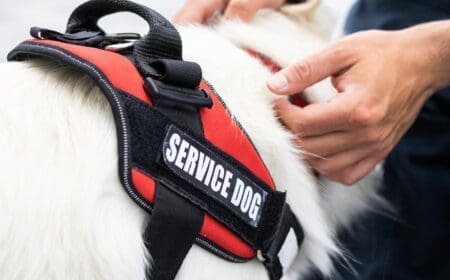Animal assistance has become a wildly recognized form of beneficial aid. Whether you are looking for a dog to fetch your medicine or a cat that can help keep you calm throughout the day, there’s an animal that can fill the role admirably. People may immediately think of a clear-eyed canine guiding blind owners through busy city streets, but animals have evolved.
Service dogs fill many different positions, from psychiatric services, such as alerting owners to panic attacks and preventing PTSD flashbacks, to autism service dogs. Similarly, emotional support animals (ESA) come in a constantly shifting silhouette of shapes and sizes, from golden retrievers to grazing cows (seriously!).
These new compassionate companions are classified differently than service dogs and pets; however, several states have unique laws surrounding an ESA. To help keep folks informed about what their four-legged friends can do, we will be going over North Carolina’s emotional support animal laws and what they entail.
What Are Emotional Support Animals?
Sometimes known as a therapy or comfort animal, an emotional support animal is any domesticated animal with an agreeable attitude that can help uplift its owner. These animals do not require training, as they will not fulfill any specific task other than providing a nearby companion that can calm their owner’s nerves.
Even though they do not require training, most owners who bring their emotional support animals will give them obedience training and some early socialization. This essential training helps keep them behaved and calm in public areas, which helps lessen the likelihood of them causing a problem or upsetting anyone who may be nervous near them.
They have been used in several settings, such as prisons, schools, hospitals, and other high-stress environments, to help people cope with anxiety, depression, and stress. They can sincerely help those going through difficult times and have been proven to offer measurable improvement for several mental conditions.
The Facts Behind Emotional Support Animals
Due to the lack of training or cynical people having trouble taking a cat seriously as a therapy tool, many are skeptical about the benefits of emotional support animals. So, before discussing whether they are right for you and the laws surrounding them, let’s discuss how animals benefit people.
Studies indicate that therapy animals can help bring comfort to folks dealing with depression, anxiety attacks, high stress, phobias, personality disorders, and much more. While they do not offer the specialized training of a psychiatric service dog, they can help folks unwind, distract themselves, and learn to socialize better.
Certain animals with long histories with humans, like dogs, can even measurably improve a person’s emotional well-being. Being around and in the presence of canines has been shown to reduce cortisol levels (a stress hormone). Similarly, petting a pooch has been associated with increased oxytocin levels, often called the love hormone.
A study of veterans and first responders who suffered from PTSD showed fewer symptoms from the inclusion of a service dog compared to other struggling service members.
Depending on what causes mental pressure and stress, enjoying the company of an animal can genuinely benefit their owners. Take social anxiety, a commonly misunderstood condition. People tend to think of it as a stress response when confronted with social situations, though this is a very limited definition.
Social anxiety comes from an irrational worry about being criticized or humiliated by others. This fear can present itself in myriad ways but often results in isolation, overanalyzing previous interactions, and a heightened stress response in public settings. Even when dealing with people who genuinely want to help, social anxiety can make it hard to let down walls and relax.
These fears and worries are not as pressing with an emotional support animal. Humans don’t commonly associate judgment and hidden criticisms with a session of petting, so interactions with animals can feel wholesome and unburdened. This freedom from social pressure can help lonely or isolated people start to feel genuine companionship.
Are Emotional Support Animals Right For Me?
If any of the previous mental pressures feel familiar to you, having an emotional support dog could help. We live in an age of pronounced emotional disruption that can be quietly felt in most corners of the globe. The National Institute of Mental Health (NIMH) predicts that one in five people is currently dealing with some form of mental illness.
If you aren’t currently experiencing some form of phobia, personality disorder, or mental battle, you likely know a few people who are. Thankfully, the world has become much more knowledgeable about mental illness and has taken the epidemic far more seriously. If you need a bubbly buddy to make your day easier, there are a few steps you need to take.
1. Schedule a Meeting with a Licensed Mental Health Professional
Folks who are interested in an emotional support animal will first need to be diagnosed by a mental health professional to see if they have a mental illness. If you are found to have a mental illness, you can discuss the potential of getting an emotional support animal. Keep in mind some health professionals will not sign off on an ESA even if you meet the requirements.
The following conditions (and similar illnesses) qualify a person to get an emotional support dog:
- Anxiety
- Phobias
- Post-Traumatic Stress Disorder
- Depression
- Schizophrenia
- Loneliness
- Personality Disorders
This list is not exhaustive, and certain unmentioned conditions may also entitle you to an emotional support animal should a medical professional deem it beneficial.
2. Have an Animal That Can Provide Sincere Benefit to Your Life
While it may seem like a no-brainer to pick your favorite cuddly buddy and put him in the emotional support position, there are some things to consider first. You will need to ensure that the animal has an agreeable temperament that is calm, attentive, and unlikely to cause issues in social settings. Similarly, start thinking about how they will fit into other parts of your life.
A Clydesdale is a brilliant steed with a beautiful gallop and an intelligent mind. Still, it is unfit to be the emotional support animal of someone living in a Manhattan apartment. As we will discuss in the North Carolina ESA Laws section, there are several places your assistant animal may be unable to go.
Having a massive or exotic animal may hurt your chances of bringing an ESA into public areas, your work, and getting them accommodated to live with you. This obstacle is why people choose smaller animals or dog breeds with a history of service positions, such as golden retrievers.
The two things to keep at the forefront of your mind when choosing an ESA are how the animal can help your illness and how it will fit into social settings and potential living situations.
3. Get an ESA Letter
There will be several situations where you need to verify your dog is an emotional support animal, as they are not classified the same as service dogs or pets. Because they are not typically wearing vests or other identifiable attire, an ESA letter is necessary to ensure your animal is an authentic assistant.
If you have already identified what animal you want as an emotional support animal and have been diagnosed, then you are halfway there. You will need to set up an appointment with a qualified mental health professional and see if they are willing to agree to an emotional support animal for you.
Bear in mind that professional opinion may play some part in your chances of getting animal assistance. If they agree, they will write you an ESA letter, which will work like an ID card for your pet, and verify them as an emotional support animal.
North Carolina Emotional Support Animal Laws
Residents of the Tarheel state who have recently gotten an emotional support animal may rightfully feel like they are trying to canoe upstream. Getting an emotional support animal is not always easy, and now they have to learn where they can and can’t go and how travel will work going forward. Even worse, how will landlords handle their new ESA?
These feelings of confusion and concern are entirely valid. Having an emotional support animal can be a massive shift in lifestyle, though it doesn’t have to be. By understanding the laws surrounding your new therapy animal, you can easily navigate most facets of society with a few notable outliers.
North Carolina ESA Travel Laws
The truth is that travel used to be very accommodating for emotional support animals. When the Air Carrier Access Act (ACAA) first took effect, it considered all animal assistants to be service animals and allowed them to board planes with their owners. As of late 2020, however, the law changed to reserve the privilege exclusively for service animals with specialized training.
While emotional support animals can still technically fly as long as the airline approves, almost no airlines in North America do at the time of this article. Psychiatric service dogs can board, so if having your emotional support animal is essential, consider upgrading their training. Service dogs must also comply with specific rules and guidelines, however.
Service dog owners will typically have to present DOT forms that indicate the animal’s health, temperament, and specific training. Service dogs are commonly restricted to two to a person, must fit in the foot space, and cannot disrupt the flight by scaring passengers or being unruly. If the airline wishes, they can request that service dogs remain harnessed or on leash.
Pets and comfort animals are still allowed to fly, though they may have to pay a pet fee and will be stowed in the back with the rest of the pets. If you still plan to bring your ESA, it must remain kenneled through the airport and cannot roam around. United States airports are required to have animal relief areas, so ask employees if you need to relieve your animal before the flight.
North Carolina ESA Housing Laws
Finding a living situation for your emotional support animal is significantly easier than getting it onto a plane. The Fair Housing Act (FHA) offers owners of emotional support animals considerable protection when looking for new housing arrangements. Landlords (mostly) cannot reject an animal if a prospective tenant presents an ESA letter.
Since an emotional support animal is not classified as a pet under the Fair Housing Act, landlords cannot charge fees for tenants to house their ESA. Similarly, if the tenant discloses a disability and presents the ESA letter, the landlord must attempt to find a suitable place for the animal.
The only way the landlord can reject a tenant and their assistant animal is:
- The landlord or real estate company would face extensive financial or administrative strain.
- Granting the animal access would terminate the essence of the operation.
- The emotional support animal is a sincere danger to other tenants and employees.
- Letting the animal into a property would all but guarantee property damage.
Outside of these listed conditions and a few unique housing arrangements, landlords must allow emotional support animals into apartments or homes. If you plan to move into confined or modest housing, ensure your ESA can comfortably live in smaller environments to lessen issues.
North Carolina ESA Business Access Laws
Where your emotional support animal can wander is primarily up to the discretion of business owners. Service dogs and emotional support dogs have different distinctions, and their ability to enter public areas is covered by the Americans with Disabilities Act (ADA). In the ADA, a therapy animal’s ability to enter public areas is up to the location’s owner.
While service dogs are typically allowed in places where their owner is, emotional support dogs are classified as non-essential when dealing with public areas and businesses. Owners may find this frustrating, but it does not mean you will have to leave your dog at home every time you go out.
Several restaurants offer patio seating and other options that allow for animals, and there are many outdoor markets in cities worth considering in favor of indoor groceries. Some stores will still allow dogs inside, so research your local area. Similarly, for canine owners, it may be worth shifting your pooch into psychiatric service should you need constant companionship.
Emotional support animals that are more extraordinary might have trouble getting accepted into public businesses, particularly if they upset or frighten other customers.
North Carolina ESA Employment Laws
We all have had jobs that completely wreck our peace of mind, and it is entirely understandable to want to bring a therapy animal to work. However, under the Americans with Disabilities Act, this is not required by law and will be up to the employer or business owner. While this does not mean your ESA will always be rejected, it largely depends on your employer and job.
There are several casual careers with laid-back settings that allow for cats and canines, especially if it improves morale among you and your coworkers. More intense jobs like factories, construction sites, kitchens, and hospitals may not be as open to the idea.
If you are allowed to bring your comfort animal to work, ensure that it is adequately trained and can remain calm and content as you perform your job. While a company may initially accept the agreement, it will quickly change its mind if it finds the animal distracting or disruptive.
For service dogs, companies will be required to allow the animal unless it causes health violations or otherwise endangers people on-site.
Understanding North Carolina Emotional Support Animal Laws
An emotional support animal is legally required to be offered reasonable accommodations when its owner is seeking a home. However, sitting with its owner on planes or accompanying them to work or a private business is not legally required. Conversely, a service dog must be allowed to help its owner in most public situations and employment opportunities.
While there are limits to where an emotional support animal can go, alternatives are always worth considering. Airlines are not the only way to travel; other transportation options may be preferable. Similarly, many businesses allow animals to some extent, and many jobs offer remote work. If your therapy animal benefits your mental health, it is worth making sacrifices for.




